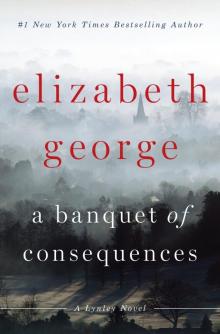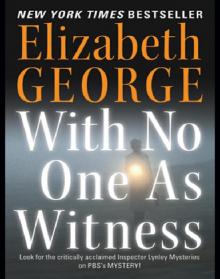- Home
- Elizabeth George
What Came Before He Shot Her il-14 Page 25
What Came Before He Shot Her il-14 Read online
Page 25
He asked his question without thinking. “Why d’you hang wiv him, mon?”
Cal lifted his head, neither chuckling nor smiling. He took another long hit of the spliff before he answered, although the act of toking up was in itself a form of reply. He said, “He need me. Who else goin to guard dis door, make sure he can do Arissa in peace wivout some blood blasting in and taking him out while he’s got his trousers down. Man’s got enemies, innit.”
And so he did, although not one of them was an enemy without reason. They existed among the women the Blade had used and deserted and among the men who were more than eager to take over his patch. For the Blade ran a sweet operation: He had weed, bone, and powder for cash but also for goods or, better yet, as barter. Plenty of young men on the streets had been willing to risk themselves taking on this jewellery shop at the Blade’s command or that post office or the other corner grocery or some darkened house where the owners would be out on a Friday night . . . and all to get supplied with whatever it was that they used to get high. With this as his main line of business, there were any number of thugs who wanted in on the Blade’s action, no matter the risks that went with it. Even Joel had to admit that there was something enticing about inspiring fear in some, jealousy in others, loathing in most, and—if the truth be told—lust in girls eighteen and younger.
Which explained—at least in part—what had happened to his own sister, who was the last female on earth whom Joel would have expected to get involved with someone like the Blade. But involved she clearly had been, a piece of information he’d gleaned the night of Toby’s birthday. He said to Calvin, “Guess you got to protect him, innit. Di’n’t do dat good when he came to see us, though.”
Cal finished the spliff and pinched the end of it, carefully depositing the quarter inch of what remained into an old tobacco tin that he took from his pocket. He said, “I tol’ him I should go wiv him, but the man wa’n’t havin none of dat. He wanted Arissa seein the Blade being the Blade, y’unnerstan. Collectin what was his and makin your sister wish on her stars she wa’n’t alive.”
“He doesn’t know Ness if he thought he’d make her wish dat,” Joel remarked.
“Das right,” Cal said. “But it wa’n’t never ’bout him knowing her. The Blade too busy to know any slag. Least too busy for anyt’ing other dan a plunge-oh-ramma-damma wiv her, y’unnerstan.”
Joel laughed at the term. Calvin grinned in response. The door to the block of flats opened.
The Blade stood there. Calvin got quickly to his feet, a remarkable manoeuvre considering his condition. Joel didn’t move, although he wanted to take a quick step back in response to the look of hostility that played across the Blade’s sharp features. The man flicked a contemptuous glance at Joel, dismissed him like a bug, and went on to direct his attention to Cal.
“What you doing?” he demanded.
“I been—”
“Shut up. You call dis watching? You call it guarding? And wha’ is dis shit?” With the tip of his cowboy boot, the Blade toed the pad on which Cal had been drawing. He looked at the picture. He looked back at Cal. “Mummy, Daddy, and the kids, Calvin? Das wha’ you got here?” His lips worked around a smile remarkable for the degree of menace it managed to convey. “Missing dem, mon? Wondering where dey are? Pondering why dey all jus’ disappear one day? Maybe it’s cos you a loser, Cal. Ever t’ink of dat?”
Joel looked from the Blade to Calvin. Even at his young age, he was able to see that the Blade was itching to do damage somewhere, and he intuitively knew he needed to be out of this place. But he also knew that he couldn’t afford to look afraid.
“I had an eye out, bred.” Calvin sounded patient. “Ain’t been no one in dis street past hour, I c’n tell you dat.”
“Dat th’ case?” The Blade flicked a glance at Joel. “You call dis no one? Well, I guess it’s right, innit. Half-caste bastard wiv his half-caste sister. They pretty much no one, all right.” He gave his attention to Joel. “What d’you want, den? You got business round here? You bringing a message from dat slag you call sister?”
Joel thought of the knife, the blood, and the stitches in Ness’s scalp. He also thought of who his sister once had been and who she was now. He felt an unaccountable sense of grief. It was this that made him say,
“My sister ain’t no slag, mon,” and he heard Cal’s breath hiss in, like a warning from a snake.
“Dat what you t’ink?” the Blade asked him, and he looked like a man setting up to make the most of an unexpected opportunity. “Want me to tell you the way she likes it, den? Going up the chute. Dat’s how she wants it. Fact is, dat’s the only way she wants it, and she wants it all the time, every day in fac’. Got to give the slag real discipline, don’t I, to get her to take it any other way.”
“Maybe dat’s the case,” Joel said agreeably, although he wasn’t at all sure he could speak past the tightness coming into his chest. “But maybe she knew dat was best for you. You know what I mean: th’ only way you could ackshully do it.”
Cal said, “Hey, bred,” in a clear tone of warning, but Joel had ventured into this river too far. He had to reach the other side. Anything less and he’d be marked as a coward, which was the last conclusion he wished someone like the Blade to reach about him. He said, “She nice, like dat, Ness is. See you limp no matter how you try, Ness goin do summick to help you out. Anyways, taking it dat way—through the back like you say—she don’t have to look at your ugly mug. So it works out good for both of you.”
The Blade said nothing in reply. Calvin’s breath went out in a whoosh. No one knew the Blade as Calvin Hancock did, so he was the one who knew exactly what the other man was capable of, pushed to the wall. He said, “You get on ’bout seein your mate on Six Ave, bred,” and he sounded quite different from the pleasantly high pothead who had been speaking to Joel prior to the Blade’s appearance on the scene.
“Don’t t’ink you want to get into it here.”
The Blade said, “Oh, dat’s beautiful, innit. Guarding me from dis? Dat what you’re doing? You one useless piece ’f shit, y’unnerstan?” He spat on the path and said to Joel, “Get out ’f my sight. Not worth th’ effort to sort. Not you and not your ugly cow sister.”
Joel wanted to say more, despite the foolhardy nature of that desire. In the manner of a young cock ready to challenge his better, he wanted to take on the Blade. But he knew there was no way he could match the man, and even if he could have, he would have had to go through Cal Hancock to get to him. On the other hand, Joel knew he could not skulk off upon the Blade’s order to do so. So he waited a good thirty terrifying seconds of staring the Blade down, despite the furious rushing of blood in his ears and the equally furious churning in his gut. He waited until the Blade said, “Wha’? You deaf or summick?” and then he worked up enough juice in the desert that was his mouth so that he, too, could spit on the path. Once he’d done that, he turned on his heel and forced himself to walk—not run—back to the pavement and from there down the street.
He didn’t look back. He didn’t hurry either. He made himself saunter as if he were someone without a care. It wasn’t easy for him to do, on rubbery legs and with a chest so constricted he could barely get enough air to remain conscious. But he did it, and he gained the end of the street before he vomited into a pool of standing water in the gutter.
Chapter
12 The day of Ness Campbell’s appearance before the magistrate did not begin auspiciously, nor did it develop or end that way. Traffic thwarted her timely arrival at court, which proved to be only the beginning of her undoing. This undoing was advanced by her attitude towards the entire proceedings, which was not a good one and which was worsened by the condition of what must be called her erstwhile friendship with Six and Natasha.
Six and Natasha were not unmindful of the difficulties they might face should Ness decide to name them as her accomplices in the attempted mugging for which she had been arrested. While one way of assuring that this naming did n
ot happen might have been to encourage a meeting of the minds with Ness, neither Six nor Natasha possessed adequate language skills to effect an agreement. Nor did they possess either the ability or the imagination to see beyond the immediate moment in order to assess the consequences of any action they might take. Their way of making their feelings known—these feelings being worry over having to face the magistrate themselves, not to mention a modicum of anxiety about having to deal with their parents’ wrath in the matter— was to avoid Ness as if she were a carrier of the Ebola virus. When this didn’t suffice to give Ness the message that their friendship was at an end, they went on to tell her directly that they didn’t like the way she’d been acting, “like you t’ink you’re better’n anyone else, when all you are is a bloody stupid cow.” And that approach worked fine.
So when Ness went to face the magistrate, she went with the knowledge that she stood alone. She had Kendra with her, but Ness was not of a mind to seek succour from her, and her feelings for the social worker—whom she’d finally met and to whom she’d revealed nothing of value—were not of a sort to make Fabia Bender’s presence good for much. Thus when Ness faced the magistrate, she projected an attitude so far from remorse and humility that the only recourse he saw was to throw every available book at her.
The saving grace for Ness was that hers was a first offence. So while another young woman evidencing the same degree of indifference to the proceedings, to her advocates, and to her life might have found herself sentenced to what the magistrate—with an antique formality that might have been endearing in other circumstances—insisted upon referring to as “borstal,” Ness received two thousand hours of community service: to be religiously documented, supervised, and signed off by the individual in whose charge this community service was intended to be served. And, the magistrate concluded, Miss Campbell would be attending school when the autumn term began. He didn’t add “or else,” but that was understood.
Fabia Bender told Ness she was lucky. Kendra Osborne did the same. But Ness saw only that two thousand hours of community service might take her the rest of her life to serve, and her displeasure was in exact proportion to what she believed were the inherent inequities of the situation. “Ain’t fair,” was how she put it.
“You don’t like it, you tell them the names of your mates and where to find them, then,” was how Kendra responded.
Since Ness was not about to do that—despite Six and Natasha’s rejection of her—she had no other recourse than to serve her time. This, she learned, would take place at the Meanwhile Gardens child drop-in centre, a site whose complete convenience to her home also did not garner from Ness any degree of appreciation. Instead she was the incarnation of a young woman put upon, and she decided to make her supervisor at the child drop-in centre aware of this at the first opportunity. That opportunity came quickly enough. A phone call from Majidah Ghafoor on the same day as Ness received her sentence informed her of the hours that she would be expected to work. They would begin immediately, Ness was informed. Since she lived less than fifty yards from the site of her community service, she could come round right now and hear the rules.
“Rules?” Ness asked her. “Wha’ you mean, rules? Dis ain’t no prison. Dis is a job.”
“A job to which you have been assigned,” Majidah told her. “Come at once please. I shall wait ten minutes before phoning probation.”
“Shit!” Ness said.
“Less than well expressed,” Majidah told her in the pleasant accent of her place of birth. “We will be having no profanities in the drop-in centre, miss.”
So Ness went around, still in the state in which her appearance before the magistrate had left her. She let herself in through the gate in the chain-link fence and stalked across the play area to the cabin that housed all the indoor activities offered to children six years old and under. There, with the children gone for the day, Majidah was in the process of doing the washing up after a late-afternoon snack of milk, toasted tea cakes, and strawberry jam. She handed Ness a tea towel to begin drying glasses and plates (“And see you do take care, for you will pay for whatever it is you happen to break”), and she started to talk.
Majidah Ghafoor turned out to be an ethnically attired Pakistani woman of young middle age. She was a widow who, in defiance of the traditions of her culture, refused to live with any of her married sons. Their wives she deemed “too English” for her liking, despite the fact that she’d had the main hand in choosing each of them, and while she found her eleven grandchildren attractive, she also saw them as largely an undisciplined lot destined for lives of dissolution unless their parents reined them in.
“No, I am happier on my own,” she told Ness, who couldn’t have been less interested in matters pertaining to Majidah’s life. “And you shall be as well. Happy here, that is. As long as you adhere to the rules.”
The rules consisted of a catalogue of the forbidden: no smoking, no mobile phone use, no land line use, no heavy makeup, no excessive jewellery, no music via iPod, MP3 player, Walkman, or anything else, no card playing, no dancing, no tattoos, no overt piercings of the body, no visitors, no junk food (“This McDonald’s is the bane of the civilised world, I do think”), no revealing clothing (“such as what you are currently wearing, which I shall not allow in this building again”), no adult or adolescent person inside the fence unless accompanied by a child of six or younger.
To all of this, Ness rolled her eyes expressively and said, “Whatever. S’when do I start?”
“Now. Once you have finished with the dishes, you may scrub the floor. While you do that, I shall come up with a schedule for you. This I will send to your probation officer and your social worker, so they will see how we intend to work on the two thousand hours you were given for your crime.”
“I di’n’t commit no—”
“Please.” Majidah cut her off with a wave of the hand. “I am not the least interested in the nature of your disreputable activities, miss. They shall have no part in our business arrangement. You are here to complete hours; I am here to document that completion. You will find a mop and bucket in the long cupboard next to the sink. I require hot water and a cup of Ajax. When you have finished the floor, you may clean the loo.”
“Where you markin down my hours, den?”
“That, miss, is not for you to concern yourself about. Now shoo, shoo. Work awaits us both. The centre must be tidied and there are only you and I to do it.”
“No one else works here?” Ness asked, incredulous.
“Which makes the day blessedly full of activity,” Majidah said. Ness didn’t think she was going to be seeing it that way. But she found the mop, the bucket, and the Ajax and she set to work on the drop-in centre’s green lino floor.
There were four rooms in all: kitchen, storage room, toilet, and activity room, with the most serious grit and grime in the two rooms to which the children were given access. Ness mopped the activity room, where pint-size tables and chairs were scattered across a floor made sticky by various spillages. She did the same to the toilet, shuddering to think what the various spillages in there implied. Under Majidah’s supervision, she went on to scrub the kitchen. The storage room, she was told, required only a thorough sweeping out, after which she could dust the shelves and the windowsills and clean the lopsided Venetian blinds.
Ness did all of this with less than good grace, muttering and casting sidelong looks at Majidah, which the Pakistani woman ignored. At a desk to one side of the room, she instead occupied herself with two schedules: Ness’s and the children’s. She viewed Ness’s assignment to the drop-in centre as a gift from the gods, and she intended to make use of that gift. How Ness felt about matters was not her concern. Experience had shown her that hard work killed no one, nor did accepting what life threw at you.
KENDRA MET UP with Cordie for advice once Ness had received her sentence. She went to her house in Kensal Green, where Cordie was tolerantly taking part in her two daughters’ fantasy tea party in
the cramped back garden. Uncharacteristically, Manda and Patia had decided upon a royal theme for this event, with Manda acting the role of monarch—ancient pillbox hat, lace gloves, and oversize handbag on her arm—and Cordie and Patia playing a grateful and decidedly nonroyal public invited to partake of Fanta orange served in chipped china cups (courtesy of the charity shop), bowls of crisps (in Patia’s favourite flavour, which happened to be lamb and mint), a bag of cheddar popcorn emptied into a plastic colander and set in the middle of the rickety garden table, and a plate of Jaffa cakes looking rather crumbly.
Manda, apparently suffering some degree of confusion over the respect demanded by the papacy and that demanded by the monarchy, was imperiously directing her mother and sister to kiss her ring when Kendra joined them. The child was standing on a deck chair in lieu of sitting on a throne, and, quite caught up in a role for which she was clearly born, once her ring was kissed, she went on to give instruction in the proper position of teacup in relation to one’s pinky. Patia declared all of this rubbish and demanded to be monarch instead. Cordie informed her that she’d lost the coin toss fair and square, so she’d have to play along until next time when, one hoped, her luck would improve.
“An’ no pouting ’bout it,” Cordie told her.
When Cordie saw Kendra, admitted to the house and then to the garden by Gerald, who was watching a World Cup football match beamed live from Barbados, she asked leave of her majesty to speak to her friend. Leave was reluctantly given, and even then her decree was that Cordie could not take her teacup with her. Cordie curtseyed and backed off with a suitable degree of humility. She joined Kendra on the small patio that made a square just outside the back door. It was a fine day, and from the back gardens on either side of Cordie’s, other families were enjoying the weather with outdoor meals, outdoor music, outdoor conversations, and the occasional argument. The noise of all this floated over the walls, providing an ambience that promised to remind them of where they were at all times, lest they begin to think themselves—as Manda and Patia would have them—in a palace garden.

 Well-Schooled in Murder
Well-Schooled in Murder Just One Evil Act
Just One Evil Act This Body of Death
This Body of Death The Edge of the Water
The Edge of the Water For the Sake of Elena
For the Sake of Elena Believing the Lie
Believing the Lie The Edge of the Shadows
The Edge of the Shadows Just One Evil Act: A Lynley Novel
Just One Evil Act: A Lynley Novel In Pursuit of the Proper Sinner
In Pursuit of the Proper Sinner A Moment on the Edge:100 Years of Crime Stories by women
A Moment on the Edge:100 Years of Crime Stories by women Elizabeth I
Elizabeth I I, Richard
I, Richard A Traitor to Memory
A Traitor to Memory Missing Joseph
Missing Joseph A Suitable Vengeance
A Suitable Vengeance Careless in Red
Careless in Red A Banquet of Consequences
A Banquet of Consequences Playing for the Ashes
Playing for the Ashes With No One As Witness
With No One As Witness Deception on His Mind
Deception on His Mind The Best American Mystery Stories 2016
The Best American Mystery Stories 2016 A Great Deliverance
A Great Deliverance In the Presence of the Enemy
In the Presence of the Enemy Believing the Lie il-17
Believing the Lie il-17 The Edge of the Light
The Edge of the Light SW01 - The Edge of Nowhere
SW01 - The Edge of Nowhere A Place of Hiding
A Place of Hiding What Came Before He Shot Her il-14
What Came Before He Shot Her il-14 Payment In Blood
Payment In Blood The Punishment She Deserves
The Punishment She Deserves This Body of Death: An Inspector Lynley Novel
This Body of Death: An Inspector Lynley Novel Just One Evil Act il-18
Just One Evil Act il-18 What Came Before He Shot Her
What Came Before He Shot Her Missing Joseph il-6
Missing Joseph il-6